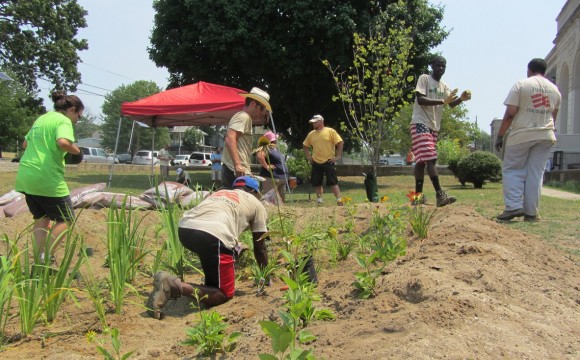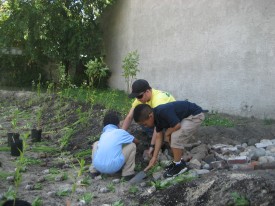
Rutgers Cooperative Extension Water Resources Program Staff member Amy Boyajian directs participants from The Nature Conservancy’s LEAF Program in planting a rain garden at Woodrow Wilson High School in Camden, NJ.
In January 2013, the Camden SMART Initiative received the Governor’s Environmental Excellence Award for its efforts to promote sustainability and the use of green infrastructure to reduce flooding and combined sewer overflows in the City of Camden. The Rutgers Cooperative Extension (RCE) Water Resources Program is a founding member of the initiative and, for the past three years, has led programs at the Camden SMART Initiative to design and implement demonstration green infrastructure projects across the city. Rutgers has long led the research and promotion of the use of innovative green infrastructure techniques to reduce the amount of stormwater runoff that reaches the combined sewer system.
Camden, like many older urban centers across the country manages both wastewater and stormwater in a single network of pipes. Every day the system carries wastewater to the treatment plant for processing. When it rains the pipes fill with runoff from the city. During rain storms runoff combines with the untreated wastewater. If the pipes and treatment plant cannot handle the combined volume of water, an overflow occurs. In Camden and cities across the country, these overflows of untreated wastewater and stormwater discharge directly into rivers, lakes, and streams. In some neighborhoods the untreated water floods city streets and parks and, sometimes, even backs up into residents’ homes and basements.

RCE Water Resources Program student intern Dillon Swiderski assists youth from the after-school program in planting a rain garden at the Neighborhood Center on Kaighns Avenue in Camden, NJ.
Rutgers is working closely with the Camden SMART team to identify neighborhoods at risk and to design and implement green infrastructure strategies that will reduce stormwater runoff to the combined sewer system and minimize the impacts of combined sewer overflows (CSOs) on water quality and the quality of life for Camden residents.
Over the past three years, Rutgers has designed and installed over 20 green infrastructure projects including rain gardens and cisterns, led community meetings, facilitated educational workshops, and conducted numerous programs in Camden schools.
“With limited funding we have been able to partner with local nonprofit organizations, the city, NJDEP, and the Camden County Municipal Utilities Authority to complete nearly two dozen projects that now manage and treat over 1.5 million gallons of stormwater each year. This is a tremendous first step in helping the City of Camden reduce flooding and sewer overflows to protect water quality and improve the quality of life for its residents,” says Christopher Obropta, extension specialist and director of the RCE Water Resources Program.
This approach to green infrastructure is unique for a larger urban center like Camden. Rutgers and the Camden SMART team are committed to a community-based approach that educates residents and provides them with the information and tools they need to take the first steps toward helping to improve and protect their community. In addition, these residents and youth will become the advocates that the city needs to ensure that future development and redevelopment in the city embraces sustainable practices and integrates green infrastructure approaches into all aspects of the community.
According to Obropta, “This bottom up approach is very different than what the City of Philadelphia and many other cities across the country are doing. Other cities are having to take a top down approach to implement green infrastructure and are hitting resistance from residents and businesses in adopting new strategies.”
He adds, “Here in Camden, by educating and working directly with residents at the neighborhood level, Rutgers and the Camden SMART team have been getting overwhelming support for these innovative and creative strategies as well as wide-spread interest and participation in a variety of projects and programs.”

